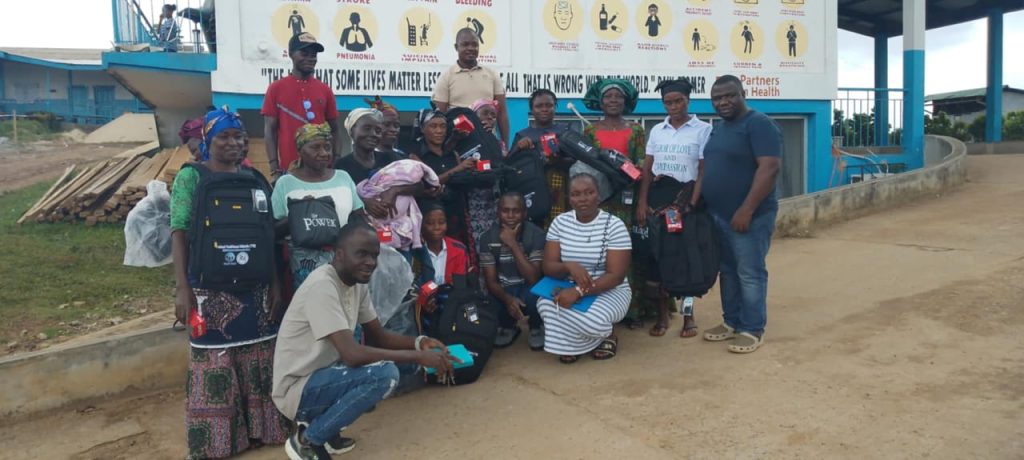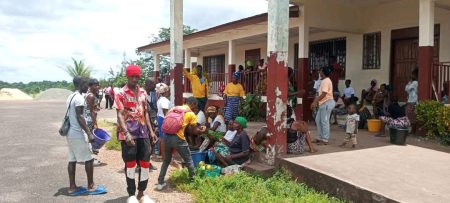In the heart of Pleebo-Sodoken District, Maryland County, Liberia, a vital initiative unfolded, aiming to bolster maternal and newborn health. The Pleebo Health Center, in collaboration with the Ministry of Health and the United Nations Population Fund (UNFPA), spearheaded a week-long campaign culminating in a day-long training session for Trained Traditional Midwives (TTMs). This comprehensive effort underscores the critical need for accessible and quality healthcare for mothers and infants, particularly within low-resource settings. The training, held at the Pleebo Health Center, brought together over 20 TTMs from diverse communities within the district, reflecting a commitment to community-based healthcare solutions. This initiative directly addresses the alarming statistics highlighting the disproportionate burden of maternal mortality in low- and middle-income countries.
The core objective of the training was to equip TTMs with the essential knowledge and skills to enhance their life-saving capabilities. The program focused on several key areas, including promoting regular health facility visits for pregnant women, actively engaging with pregnant women within their communities to address pressing health concerns, and effectively responding to emergency situations by collaborating seamlessly with healthcare professionals. This multifaceted approach recognizes the crucial role of TTMs as frontline healthcare providers within their communities, often serving as the primary point of contact for expectant mothers. By empowering these traditional midwives with updated information and practical skills, the initiative aims to bridge the gap in access to quality maternal healthcare.
Beyond skill enhancement, the training addressed practical challenges faced by TTMs in their daily work. Participants were provided with essential resources, including cellphones to facilitate communication with health facilities, raincoats for protection during travel, bags for carrying supplies, and lapas – traditional Liberian garments. This provision of essential tools directly supports the TTMs in their work, acknowledging the often-challenging conditions they operate within. The distribution of cellphones, in particular, signifies a crucial step towards improving communication and coordination between TTMs and health facilities, enabling timely interventions and potentially life-saving referrals.
Dr. Shadrick Gono, Chief Medical Officer at the Pleebo Health Center, emphasized the significance of the training in addressing the pressing issue of maternal and newborn mortality. He underscored the dual responsibility – both social and professional – to protect mothers and babies, highlighting the importance of safe childbirth practices and access to skilled healthcare. Dr. Gono strongly encouraged TTMs to actively promote health facility deliveries and discourage home births, aligning with the global push for institutional deliveries to ensure access to qualified medical professionals and emergency services. He also announced an incentive program linking higher compensation for TTMs to the number of pregnant women they successfully refer to health facilities, further incentivizing their role in promoting professional healthcare services.
The training resonated deeply with the participating TTMs, who expressed gratitude for the knowledge and skills they gained. Gertrude D. Toe, Acting Head of the TTMs in Pleebo-Sodoken District, acknowledged the indispensable role traditional midwives play within their communities, despite facing numerous challenges. She praised the Pleebo Health Center administration for organizing the training, emphasizing its impact on enhancing their capacity to provide improved healthcare services. Her words underscore the value of investing in and empowering community-based healthcare providers, recognizing their intimate knowledge of the local context and their established trust within the communities they serve.
This initiative in Pleebo-Sodoken District serves as a microcosm of the broader global challenge of reducing maternal mortality, particularly within resource-constrained settings. The training underscores the importance of a multi-pronged approach encompassing skill development, resource provision, incentivization, and community engagement. By empowering TTMs and strengthening their links with health facilities, the program strives to create a more robust and responsive healthcare system, ultimately aiming to save lives and improve the well-being of mothers and newborns. This comprehensive strategy reflects a growing recognition of the crucial role of community health workers in bridging the gap in access to quality maternal healthcare and contributing to the achievement of global health goals.
The collaborative effort between the Pleebo Health Center, the Ministry of Health, and UNFPA represents a significant step towards addressing the pressing issue of maternal and newborn mortality in Liberia. By investing in the training and equipping of TTMs, the program recognizes the critical role of these frontline healthcare providers in reaching vulnerable populations and promoting safe motherhood practices. The emphasis on collaboration between TTMs and health facilities aims to create a more integrated and effective healthcare system, ensuring that pregnant women have access to timely and appropriate care throughout their pregnancy and childbirth. This initiative aligns with the global Sustainable Development Goals, particularly Goal 3, which aims to ensure healthy lives and promote well-being for all at all ages.
The provision of cellphones, raincoats, bags, and lapas demonstrates a practical and sensitive approach to supporting TTMs in their challenging work. These essential tools not only facilitate their daily tasks but also acknowledge their dedication and commitment to serving their communities. The incentive program linking compensation to successful referrals further incentivizes TTMs to actively promote health facility deliveries and discourage home births, contributing to the broader goal of reducing maternal and newborn mortality. This comprehensive support system recognizes the vital role of TTMs and seeks to empower them as key agents of change within their communities.
The training program’s focus on education, skill development, and resource provision reflects a holistic approach to improving maternal and newborn health outcomes. By equipping TTMs with the necessary knowledge and tools, the program strengthens their capacity to provide quality care and respond effectively to emergencies. The emphasis on regular health facility visits and active engagement with pregnant women within their communities underscores the importance of preventative care and early intervention in addressing potential complications. This proactive approach aims to prevent maternal and newborn deaths by ensuring timely access to skilled healthcare services.
The positive feedback from the participating TTMs, as expressed by Gertrude D. Toe, highlights the training’s effectiveness and its positive impact on their ability to serve their communities. The program’s success lies in its recognition of the valuable role played by traditional midwives and its commitment to empowering them as essential partners in improving maternal and newborn health. By investing in their training and providing ongoing support, the initiative creates a sustainable and community-based approach to addressing this critical health challenge.
The collaborative nature of this initiative, involving the Pleebo Health Center, the Ministry of Health, and UNFPA, demonstrates the power of partnerships in achieving shared goals. By combining their expertise and resources, these organizations are creating a synergistic effect that amplifies their impact on maternal and newborn health. This collaborative model serves as an example of how different stakeholders can work together to address complex health challenges and improve the lives of vulnerable populations.
The alarming statistics on maternal mortality in low- and middle-income countries, highlighted by the World Health Organization, underscore the urgent need for interventions like the TTM training program. By focusing on strengthening community-based healthcare services, this initiative directly addresses the inequities in access to quality maternal care. The program’s emphasis on preventing home births and promoting health facility delivers aligns with global efforts to ensure that all women have access to skilled birth attendance and emergency obstetric care. This comprehensive approach holds the promise of significantly reducing maternal and newborn mortality rates and improving the health outcomes of women and children in Liberia.














